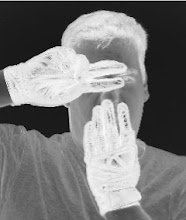
I would like to take this opportunity to express a mild fascination I have with a rather minor writing technique. Below is an extract from a column written by the comedian Dylan Moran in the Irish Times newspaper many years ago:
"Why," they say, "are you wearing pyjamas?"
"Pyjamas? These are my archery trousers."
"You don't do archery."
"Perhaps, but if we were suddenly called upon to man the crossbeam . . ."
What piqued my interest is contained in the first line of the extract, the way that the spoken sentence is split with the information concerning who is speaking. Now usually this information is positioned before or after the spoken sentence, but by splitting the sentence in this way something curious occurs. It seems to create a rather delicious interruption by putting the word "Why" first (probably one of the most important words in the English language), distracting the reader with some not necessarily important information, and then completing the sentence. For some reason, I just can't put my finger on why this is more interesting than:
"Why are you wearing pyjamas?", they say.
But to me, it clearly is. Perhaps it is a personal thing, an interest in seeing things done effectively yet unconventionally. I think there's something in this, the idea that although the written word needs to be done correctly (grammar, spelling etc.), that there is a flexibility with the English language that allows a writer to try a few oddball stunts every now and again. Now if only I could get my speling and gramar righted.
For those interested in Mr Moran's writing technique, go here.

I sometimes do that, and enjoy it too. I don't think it's unconventional, just a good timing device that makes use of the variability of English.
ReplyDeleteWhen you write long passages of dialogue it's useful to find different ways of splitting up the dialogue so it doesn't get boring, and just become a succession of 'he said: "....", she said: ".....", he said: ".....", she said: ".....", and so on.
Ever read Jane Austen or novelists of around her time? They will sometimes do this thing in their novels by placing quote marks round a passage of text to indicate that a characters speech is being relayed, but the quoted passage will not have the typical grammar/phrasing of a line of dialogue - ie, it will remain in third person/past-tense - so:
She was greatly pleased with his invitation, and indicated 'that she would be attending the dinner-party with her friend Mary, and that she looked forward to the event with great delight and anticipation.'
I find it kind of sad that this technique has dropped out of modern novels.
Am glad to hear you practice the technique Tim. I may even try it a few times myself as my struggle with writing is not so much the message (I know what I want to say) but the delivery to the reader (how to express the message effectively.
ReplyDelete"I must", proclaimed Dan, "put a halt to the babble, and serve my message with some palatability".